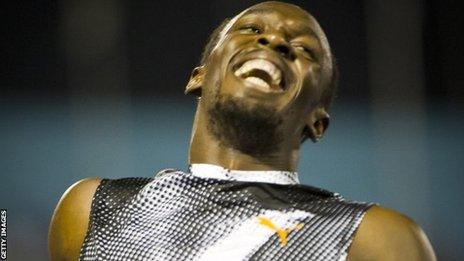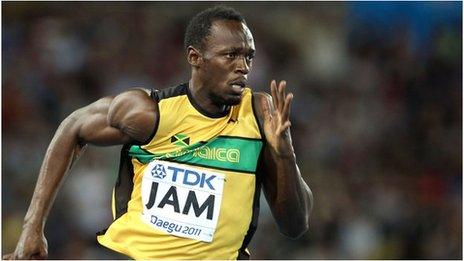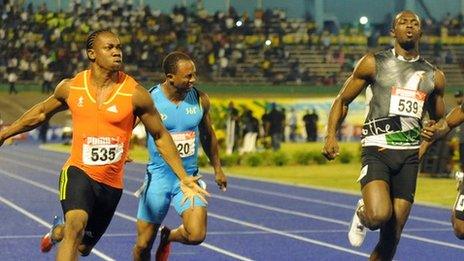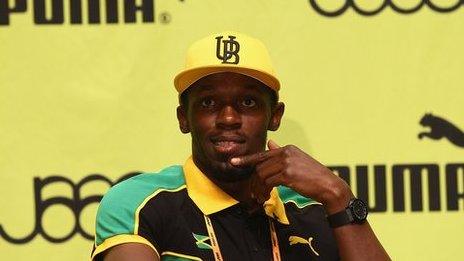London 2012: Usain Bolt heads to the Games surrounded by doubts
- Published
As pre-Olympic panics go, it's a pretty big one: the fastest man in the world, perhaps the biggest single star of the entire Games, is no longer even the fastest man in his own training group.
Usain Bolt - clown prince of track and field, the athlete who changed the paradigm for how sprinters behave and blew apart the record books with four runs so far beyond the possible that the times still barely make sense - suddenly has some serious problems on his king-sized plate.
Those two defeats to Yohan Blake over 100m and 200m at the Jamaican Olympic trials last month, while seismic, were not the start or end of it.
From the moment he clocked 10.04 seconds in Ostrava at the end of May - the slowest 100m of his senior career - the whispers began that some of the old showboating magic might be missing.
Bolt appeared as nonplussed as the watching world. "My legs kind of felt dead," he admitted afterwards, "and I don't know the reason."
There were stories of late nights out, of tight hamstrings and a troublesome back, of a return to the parties and fun times of previous post-seasons rather than hard yards and fast times that took him to the top.
Many of them were nonsense or exaggeration. Bolt's celebrity and charisma is such that he attracts rumours and hangers-on like no other track star in the world.
A week after that sluggish start in Ostrava, he ran a blistering 9.76 secs in Rome - 15 hundredths of a second faster than he had run by the same point in his record-breaking season of 2009.
Even now, with less than two weeks to go until the start of the London Olympics, he has three of the five fastest 100m times in the world this year, with that showing in Rome, into a headwind of 0.1 ms, probably worth more than Blake's season's best of 9.75 secs with a 1.1ms tailwind.
For any other athlete that would be enough to still the alarm bells and send them to Stratford with a smile on their face and a strut in their step.
But Bolt is not any other athlete. When you have won the sprint double at the previous Olympics by margins so vast your rivals were barely in the freeze-frame (he took the 100m in Beijing by 0.2 secs, the 200m by a staggering 0.66 secs) you inhabit a stage all of your own.
Few remember that Richard Thompson took 100m silver four years ago, or Shawn Crawford silver in the 200m. Should Bolt finish second in either, no-one will forget in an age.
Before the Jamaican trials, Bolt hadn't lost a 200m in four years. When Blake defeated him, not only by three hundredths of a second but by coming through and past when Bolt had led with 50 metres to go, it left spectators trackside with hands on heads and mouths agape.
Blake, of course, had beaten Bolt to 100m gold at the World Championships in Daegu last summer. But that, after the most famous false-start in the history of the sport, had felt different - the story almost entirely the disqualification, rather than the coronation.
As Blake celebrated in Kingston, Bolt was on the ground, receiving treatment from his physio for tight hamstrings.
A few days later he flew to Munich to see celebrated sports doctor Hans-Wilhelm Müller-Wohlfahrt - a session described as a routine check-up by his agent - but when followed by his withdrawal from the Diamond League meeting in Monaco on 20 July, his final competitive outing before the Olympics, it appeared to take on greater significance.
On numbers alone Bolt does not appear to be in vastly different shape than he was in his biggest years.
By the middle of June in the last Olympic year of 2008 his fastest 100m time was 9.72 secs, just four-hundredths faster than his Rome showing a fortnight earlier this time around. In 2009, the year he went to the Worlds in Berlin and blitzed even those Beijing records to bits, his quickest run at the same point was just 9.91 secs.
So what is different this year?
There are rivals out there who know how to beat him - Blake, Tyson Gay. There are others who, years after their supposed peaks, will quietly be fancying their chances anew - former world record holder Asafa Powell; Justin Gatlin, the disgraced former Olympic champion back from his doping ban.
Then there is Bolt himself.
At the peak of his powers, laughing into the pre-race cameras, beaming on the blocks as others shook, he didn't appear to feel the same pressure as the others. It all seemed part of a wonderful game, and his exultant performances felt like part of the same glorious show.
Now? Now we're not quite so sure, and neither is he.
That World Championship final 11 months ago in Daegu may have triggered a more lingering malaise than many realised.
On that Sunday morning in South Korea Bolt was 20-1 on with some bookmakers to retain his 100m crowd. When he jumped the gun - not by a flinch, but by a street - we saw something new on his face, alongside the disbelief and despair: doubt.
"I just couldn't believe it," he tells a BBC One documentary to be shown on Monday. "You see people on TV false start and you think, that must be bad luck. And then you feel how bad it is. It's awful.
"I was in great shape, I was running fast, I was good. I was sure I was going to get my medal.
Blake takes gold as Bolt disqualified
"To know it's going to happen and then lose - not even lose, not make it to the finish line - it's hard, very hard.
"I pretty much squandered it, I'd say. All I could hear was something saying GO! in my head, and I just went, and after I thought, 'What the hell just happened?'"
Bolt's start, something he had turned from average to respectable over the previous three seasons, remains his greatest weakness.
He is a remarkable 3-1 with the bookies to be disqualified for a false-start in this year's Olympic final; as Michael Johnson, his predecessor as world 200m record holder and now BBC pundit says: "I am absolutely concerned that we could lose a Bolt."
Bolt is currently lying low in west London, living near Heathrow and training at nearby tracks as he does most summers before he heads, this year, to Jamaica's Olympic holding-camp in Birmingham.
He has always talked of his desire to make history by retaining both Olympic sprint titles. Carl Lewis, who knows a thing or two about such things, isn't entirely convinced he will do so.
"The reason it hasn't been done is because it's hard to stay at that level for a long period of time," says Lewis. "People are always trying to beat you when you are a champion.
"Blake has beaten Bolt two years in a row now after the World Championships in 2011, and we don't know what Bolt's head is like when he loses."
No-one is writing Bolt off. A man who has defied logic and precedent as he has done lives under different rules of physics to the rest of us.
"Last 10 metres, you're not going to catch me," insists Bolt.
"No matter who you are, no matter what you're doing, no matter how focused you are, no matter how ready you think you are, you're not going to catch me, because that last 10 metres is going to take me three and a half strides to pass the finish line."
- Published5 July 2012

- Published5 July 2012

- Published30 June 2012

- Published27 June 2012

- Published10 September 2015
